This week like many of you, I'm thinking much about the possibilities of 2016. What joy might be around the corner? What hope might I need to find? What love is yet to be?
But when I think back over 2015, I have to admit though, it has been a TOTAL surprise! But the best kind.
I started the year as the interim pastor of a congregation in Oklahoma. I loved every minute.
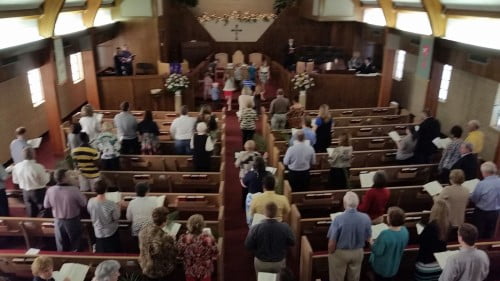
Then, early in February, Kevin and I had the professional experience of the lifetime getting to attend the National Prayer Breakfast (and heard some prophetic preaching from the President). We also had meetings with Congressional leaders via our work with Feed the Children at the White House. So cool!
On February 21st, I celebrated my birthday with these dear ones at a quiet party on top of the Devon Tower in OKC. My dear husband made this lovely surprise possible, a colliding of my worlds!
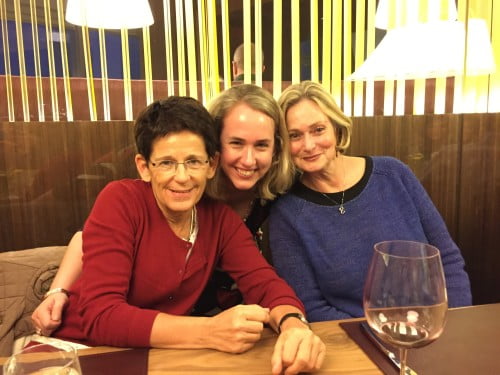
In March, I enjoyed preaching a Lent series called "First Family" sticking close to the first 5 chapters of Genesis. The sermon: "We are Clothed" was one of my favorites. Preacher friends: would highly recommend preaching through Genesis during Lent. There's some good stuff there.
Easter was a highlight as well. I led an Easter sunrise service with a fellow female pastor in the middle of Western Oklahoma. (Who would have thought it?) And then a couple hours later I preached one of those Easter sermons when I felt really proud when I was done. I wanted the congregation to know that Easter is a way of life, not just a day and I think they heard me.
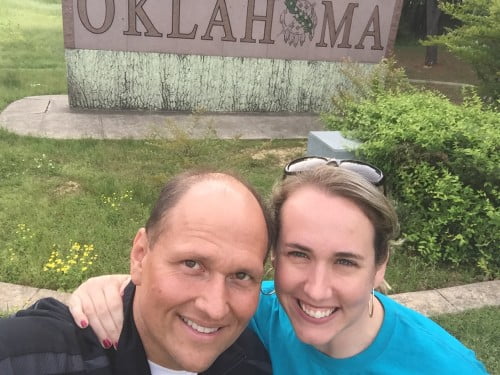 April, sadly was a month of treasuring our last days as a resident in Oklahoma in beautiful scenery like this and saying a lot of "thank you's" to God for the gifts of the journey. Most of all, the word, "Beautiful and Terrible Things Happen" was on my mind-- one of my best blog posts of the year, I believe.
April, sadly was a month of treasuring our last days as a resident in Oklahoma in beautiful scenery like this and saying a lot of "thank you's" to God for the gifts of the journey. Most of all, the word, "Beautiful and Terrible Things Happen" was on my mind-- one of my best blog posts of the year, I believe.
May was a month of rest and travel, saying goodbye (at least from our official duties) as President and First Lady of Feed the Children. I preached this sermon at the Dagoretti Children's Center in Nairobi, Kenya with tears in my eyes: "Why are the Hagans Leaving Feed the Children?" Proving yet again that I can't be in Kenya without having wet eyes.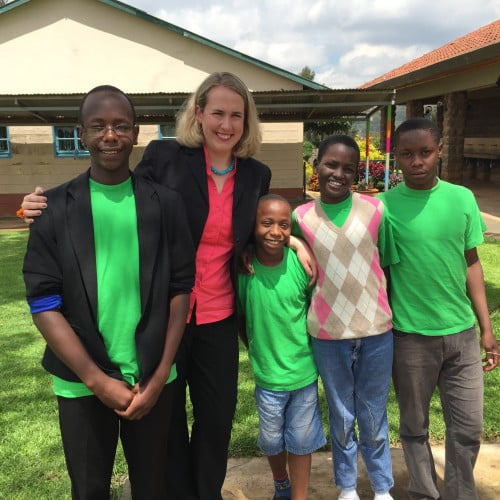
But, as much as I was saying "goodbye" to Oklahoma friends in the move, I quickly found out it was more like "see you later." It's a beautiful thing when God gives you community all over the world!
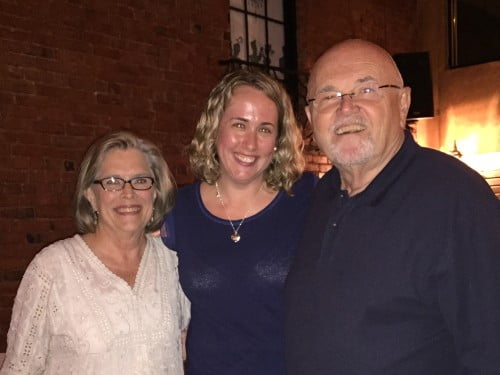
Once back in DC, God kept giving me places to preach. One of these places was at my home church, Martin Luther King, Jr. Christian in Reston.
Early in June, it was my beloved Pastor Jean's anniversary Sunday and I boldly proclaimed, "How long will you grieve?" It was one of those sermons though that made people wonder if I'd lost my mind when I started and my soul sister, Amanda and I still laugh about it. 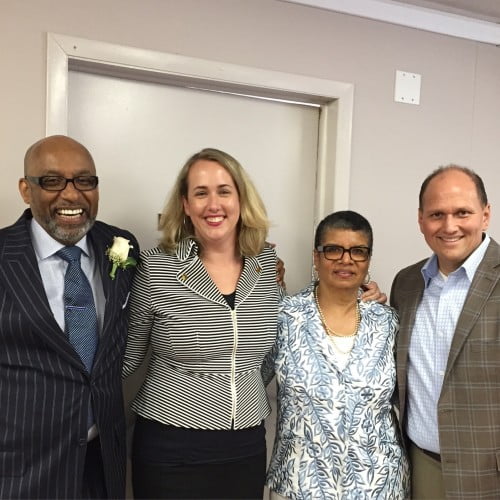
One of my favorite memories of the summer included being the Baptist House chaplain at The Chautauqua Institute in New York. Not only was it a life changing week with a friend but it was the moment I heard a word of direction about starting something new.
A HUGE NEW PROJECT is in the works and I can't wait to tell you more about it in 2016!
2015 was also the year I got over my fear of riding a bike! Look out world . . .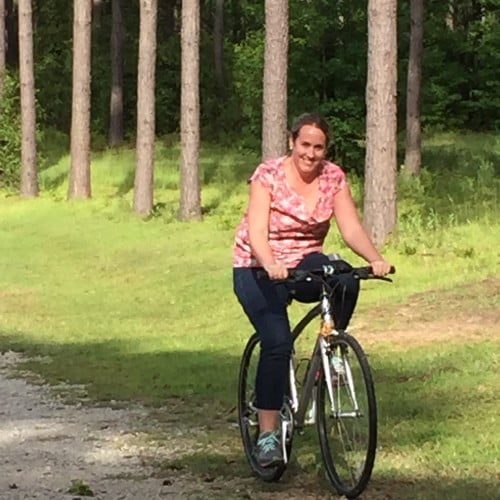
In September, Kevin and I bought a new house and prepared to move across town. After living in two states for three years we were ready to slow down and be in ONE place. Though there were bumps along the way-- the house buying process is never for the faint at heart-- we made it through and soon were settled in (though of course we have tons of work to do in the future!).
I refreshed my commitment to writing in the fall-- trying to only BLOG when I had something really burning to say and re-submitted my book proposal for publication (fingers crossed for 2016!).
And as far as the blog goes, these were three of my most read posts:
"Staying in Your Own Lane" (jealous anyone?) and "It Gets Better" (a post about marriage) and "All of Life is a Gift" (after visit to Riverside Church in NYC).
This Advent season I was asked to preach at Springfield Christian Church in Springfield, VA for the whole month. I had fun with it! My favorite service was Christmas Eve-- a service in English and Spanish. Yakelin, the ordained minister and translator I worked with was so full of the Spirit and made the experience one of my favorite of my life. We were so in sink with each other. It feel like a work of art to go back and forth between Spanish and English. I wanted to cry tears of joy when the sermon was over.
And now, we're celebrating the holidays with a beloved friend of ours from Kenya that we met in Nairobi 4 years ago. Sherlyne has brought our home so much joy and we love her very much.
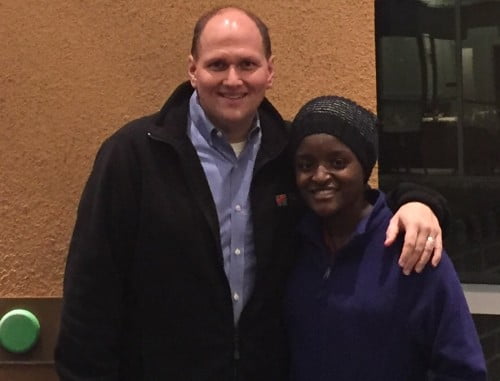
If there is anything I've learned in 2015 is to live in the moment, accept what is and cling to the good.
It could be SO easy for me to be anxious on a regular basis because so little about my life or ministry is planned or settled.
But, I hope as this post shows that when you follow God, things happen. Things you can't dream up happen! So it's only our job to hang on for the ride!
A friend of mine recently told me 'I'm his favorite circuit riding preacher." And I liked that. I can't wait to stay on the move in 2016. Coming to a town near you soon!
Who says that your life has to look like everyone else's?
Who says that emotions of Christmas are reserved only for those who you are related to?
Who says that you can't travel to two continents in one month to celebrate Christmas with over 150 children/ youth just because?
God has blessed us and so there's only one choice we have: give back. Not just in things but in physical presence.
Such as been the story of Christmas JOY for the Hagans since this time last November.
We celebrated Christmas in Kenya with these beautiful children.
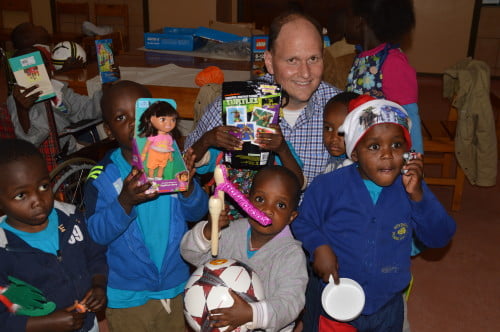
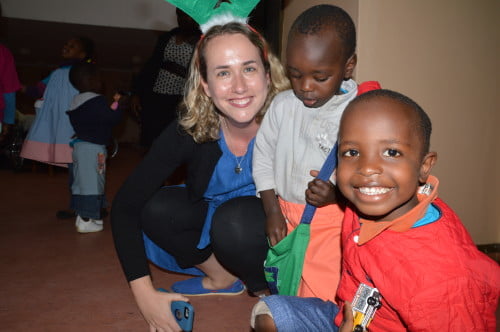
Then we traveled the last weekend to Honduras to celebrate Christmas with a group of boys living in a children's home we also knew well from our time at Feed the Children.
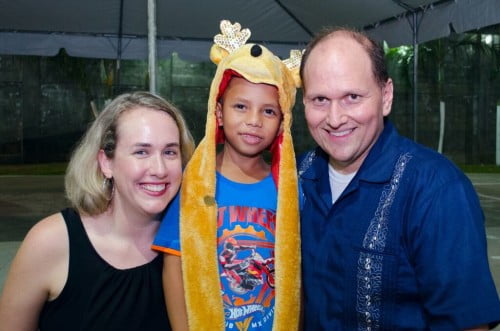
We just hung with the youth of the center.
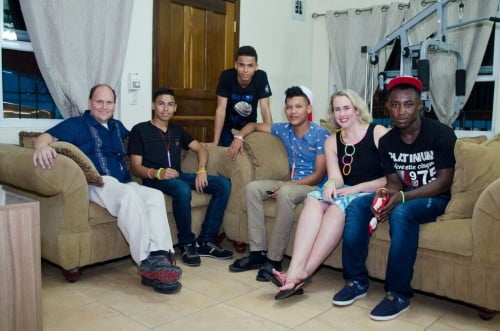
We danced the night away with these little guys too!
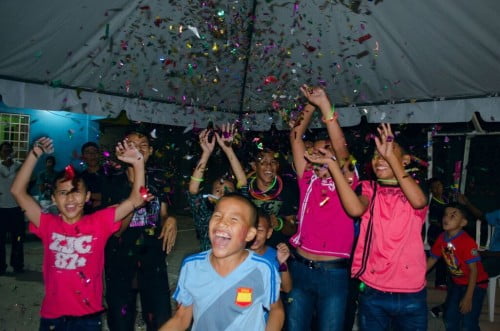
And today, we gathered around the table of those who bear our last name and played with little guys like this one . . .
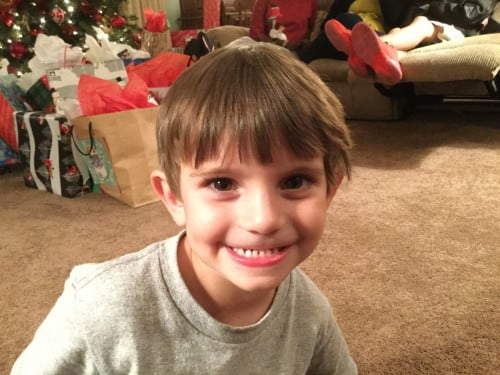
And extended family like this during the most tropical Christmas on record in Georgia!
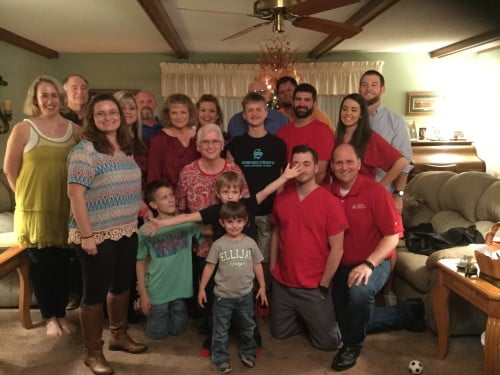
I truly believe that JOY is an emotion that you can FEEL if you allow yourself to experience it. And I feel so grateful to have received it in several unique places over the last several weeks.
In all of this, I don't want you to think that everything is perfect in our lives. There's sadness this Christmas for me as there always is. But there's joy alongside the sadness. Joy that finds a way to bubble up when I stick close to dear ones like these to me from all over the world.
Where did joy find you this Christmas?
(Thanks to Edna and Heidy for capturing some of these lovely moments on your cameras!)
A sermon preached at Springfield Christian Church on Jeremiah 33:14-16

How many times in life has someone made a promise to you?
It happens every week, if not every day, doesn’t it?
We’re at the dry cleaners and the woman behind the counter promises our clothes will be ready on Thursday.
We’re at work, and a co-worker promises us an expense report document by Friday.
We’re at home and our spouse promises to take the garbage out during a tv commercial break.
AND how many times in all of this promise making do we find ourselves disappointed?
Our son promises to meet us for dinner at 7 but calls at 6:30 to cancel.
Our best friend promises to come visit us for Thanksgiving but emails us a week before to say she has made other plans.
Our mother promises to stop nagging us about the way we clean our house and then gives us scrubbing brushes for Christmas.
Promises broken.
And in many relationships the cycle continues and continues and continues.
I have a friend who always makes big promises to show up to help me with projects only to be at least an hour late. Sometimes she’s two hours late and even more often a couple days late.
It’s gotten so bad that now we refer to her as the girl who “will be late to her own funeral.”
And with this true, it can be difficult to internalize scripture passages like the one before this morning as it begins by saying “The days are surely coming, says the Lord, when I will fulfill the promise I made.”
Yet, we aren’t so sure about this type of bold faith.
We aren’t so sure about a message of restoration on earth.
It’s just too scary when civilian planes get shot down in Egypt just because.
It’s just too full of broken dreams when national and state borders remain closed to refugees out of fear.
Our world, as we are experiencing it right now is not a place that naturally breads a lot of hope in promises when politicians and world leaders make them every day and break them the next.
To this sentiment, the original hearers of this text would be right there with us. They’d been beaten down in hopelessness too. For these hearers were a ragged, scattered group of Jews living during the Babylonian exile. And it was a time in Israel’s history when a mood of despair was much more the norm. They were refugees.
Their homeland was in ruins.
Their temple rituals no longer drew them together.
Their God, who used to be the ONE consistent thing in their life, felt distant and angry.
And Jeremiah said: “The days are surely coming, says the Lord, when I will fulfill the promise I made to the house of Israel and the house of Judah.”
The specific word of promise came to the house of Judah (known as the good child gone bad) AND to the house of Israel (known as wayward son) saying:
Or as commentator Kate Huey puts it: “Jeremiah doesn't say that things might get better, or could be better, or that [they] should be optimistic about future possibilities. The prophet says that the days are surely coming – and you can count on it because God is the one making this promise.”
I want to pause here and say this, when we read text like this, especially during the Advent the temptation is to immediately skip to talk about the coming birth of Jesus. And it wouldn’t be Advent, of course, if we didn’t read scriptures like this. But how much do you and I miss out on IF we don’t stay with the text as it was created for it’s first audience.
And what a HUGE promise this was for the Israelites! For much like we all have our own version of “the good ole days” and longing for it, Israel’s good ole days was and always would be the reign of David.
So to promise that a righteous branch would come from David’s line was equal to THE best possible future these hearers could have imagined! For throughout the Hebrew scriptures being blessed from David’s line was THE chief sign of God’s favor.
So, wow!
And verse 16 tells us by which what time this branch will be called, “The Lord is our righteousness.”
Or in other words, the way the promise is going to be fulfilled through your merit, Israel. God is going to fulfill this promise through righteousness that could only come from the Lord.
 As I was working on this sermon on the plane on Friday, coming home from Kenya heading back to the US, I was struck by the beauty before me at the moment of take off.
As I was working on this sermon on the plane on Friday, coming home from Kenya heading back to the US, I was struck by the beauty before me at the moment of take off.As our plane was descending into the clouds, a rainbow appeared just off in the horizon. It was a glorious, beautiful, rainbow, one of the most glorious ones I’ve ever seen.
And as I looked at it, with the word of “I will fulfill my promise” from Jeremiah 33 in the back of my mind, I couldn’t help but think about the story that begun in Genesis 6 that is probably very familiar to us. God sends floods to all the earth. God saves one righteous man, Noah and his family through that giant boat. Then after the flood is over says this to Noah, “Let this rainbow be a sign unto you of my promise that I will never send a flood to destroy the earth again.”
And it’s a promised fulfilled until this day, isn’t it?
A flood has never destroyed the earth again.
It is a serious thing. Promises given by God are not like the promises that fellow human being make to us and break so easily to us. Promises given by God are for reliable.
And just like it was a word for the Israelites, I believe there’s a message right here for us. To all of us today struggling with broken dreams, unfavorable lots and fair weather friends, God’s heart says to our hearts:
I will fulfill my promise to never leave nor desert you.
I will fulfill my promise to never tempt you beyond what you can bear.
I will fulfill my promise to never stop loving you.
And the list could go on with all the other promises made throughout scripture.
But here’s the thing about the timing of the fulfillment.
I am about to say something that I don’t like very much and I can imagine that you might not like either . . .
I’ll say it again. God’s promises are often not fulfilled in the timetable that you and I want them to be fulfilled in. But this does not make them any less true.
Again this is where faith comes in.
This, my friends is exactly what the season of Advent is all about, pausing to remember God’s timing—and it’s completely countercultural to what is going on out there on the city streets and in the malls which already pronounced Christmas over and put out Valentines decorations yesterday.
No, in the church during this season, we stay close to every moment, making the most of every single moment of what can be learned while we are:
Waiting.
Hoping.
And believing that God will indeed fulfill ALL of God’s promises to us.
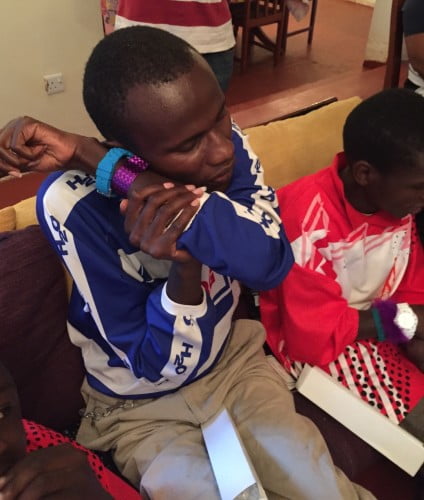 On Thursday, my husband and I shared a Christmas party (a little bit early) with the 100+ children who are a part of an orphanage in the Dagoretti sums of Nairobi.
On Thursday, my husband and I shared a Christmas party (a little bit early) with the 100+ children who are a part of an orphanage in the Dagoretti sums of Nairobi.
One of the things I like best about the programs run by this children center is they believe that no child, no matter their age or disability is ever to be left behind.
There’s a group of young men, mostly in their 20s and 30s who have aged out of the residential center for younger children but are unable to care for themselves because of their extreme disabilities. So, a new house was created for them called the Hardy home.
Over the past several years that I have gotten to know Martin, he’s always asked for one thing when it comes to Christmas presents with a bright smile on his face. “I want a talking watch,” he says. “I want a watch that tells me the time.”
Of course, my husband and I were listening to Martin’s repeated requests for a talking watch. But come to find out they are hard to find.
No shop in Kenya sold any. And no jewelry store I ever went into in the US ever had one in stock. So years passed. For the past several years, I kept asking Martin, wouldn’t he like something else. Actually trying to prod him toward something easier to find like cologne or a computer game . . .
So we kept looking. And finally, this year, thanks to an extensive online search, we found one. We couldn’t believe it. It was a battery operated, talking watch.
So when the moment came to present the gifts at the Christmas party, you should have seen the joy on Martin’s face and all of his housemates when the watch box was opened and it resounded, “It’s 2:30 pm.”
Martin so proud. We could hardly keep him sitting down. For all Martin wanted to jump up and down and up and down and say, “My talking watch, my talking watch.”
So for many of us participating in this moment of this gift, we also felt hope born in us anew.
If a young man with disabilities in a remote part of Nairobi with no means of income can wait and hope and ask for what he wants with such clarity, believing in his heart that ONE DAY it would happen, so could we!
And so can you, my friends!
We serve a God who never lets even death be the last word.
We serve a God who brings light to even the darkest of nights.
We serve a God who gives our terror filled world hope.
The days are surely coming says the Lord, when I will fulfill my promise.
For as Edward Hayes wrote in A Pilgrim’s Almanac, "Advent is a winter training camp for those who desire peace."
Do you desire more peace, more love, more joy for our world?
For the days are surely coming! Let us hope together believing in the One who will and does fulfill promises.
Thanks be to God.
AMEN
I’ve been a part of all kinds of baptismal services in my life—my own when I was baptized as a child in my father’s church in Tennessee at age 7 . . .
The ones where babies have been brought forth to be claimed in the waters by their parents . . .
And, the ones at the sick beds of those who are dying and ones by faith professing teens and adults who want to claim Jesus for themselves . . .
But I have to say the most memorable baptismal service I’ve ever experienced happened two months ago when Kevin and I were in Nairobi, Kenya.
One of the joys of our work with Feed the Children is that wherever we go, I get to be known as the unofficial pastor of the team.
Sometimes this means staff ask me to pray for them or their families that are sick.
Sometimes this means I get to enter into the deep waters of God related conversations.
And then sometimes I am asked to baptize people—something I never expected would occur.
As our relationship with the children’s orphanage in Kenya has grown, we learned there were several children who never were baptized and wanted to be. But no pastor was around to do it.
These are kids that grow up learning about God and God’s love for them, but don’t have the opportunity to be a part of a church community, where baptism would normally take place.
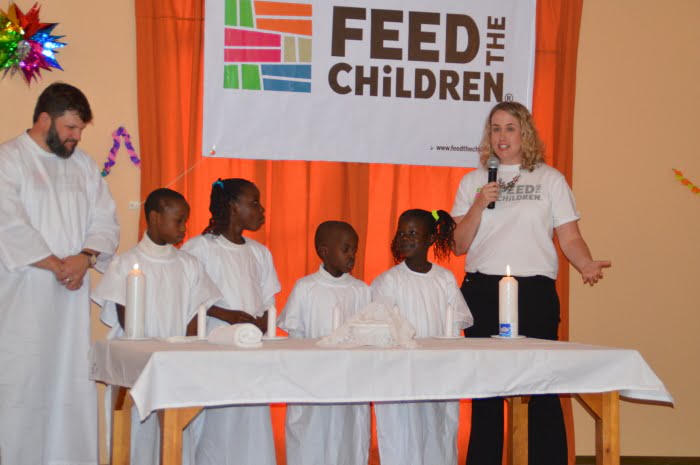 So on our last trip (and as part of the staff Christmas worship service), four children and one staffer from the US came forward for baptism.
So on our last trip (and as part of the staff Christmas worship service), four children and one staffer from the US came forward for baptism.
As I thought about all the traditional things that are said at baptismal service about being supported by your family and having your parents by your side at such a momentous occasion, I was sobered in my planning of the day.
For these kids did not have parents. Most of them had no known biological relatives—that is why they were there in the first place.
We even had to make our own certificates because I couldn’t just buy some at Christian bookstore. All of them contained a slot where parents were listed. And of course we didn’t want them to feel isolated or uncared for in any way.
So what did this liturgy I was about to perform mean?
First of all, started with what every other baptism ceremony began with: repentance.
These children know understood who Jesus was and wanted to follow Him in their life. They knew they’d already made choices that were less than God’s best for them in how they treated their peers. They wanted their life to to be about Jesus' teachings. 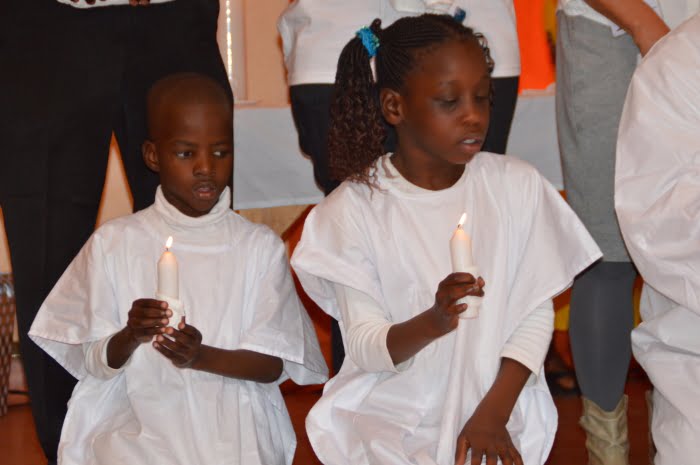
So in the service, each child declared Jesus to be Lord to the gathered community—even those with learning disabilities. It was awesome (in the truest sense of the word!) how clearly and passionately they projected their confession.
And then, it continued with the naming as I placed water over their heads and said, I now baptize you in the name of the Father, Son and the Holy Spirit.
Though these were the words that I are ones I say at every baptism and have been said through the centuries by other clergy that have gone before me, I knew in this room with these children it was different.
For in baptizing them in God’s name and reminding them that they were God’s child and their life belonged to God—they were beginning a brand new story.
And not that all of us who are baptized don’t begin this same story but that with them—this newness was all the more profound.
This is why: no longer were these children orphans. They were adopted, adopted by Christ Jesus Himself, the adoption that Paul would later write about in Ephesians, chapter 1:
God predestined us for adoption to sonship (and daughtership) through Jesus Christ . . .
Can you imagine the scene? Getting to tell a child who was abandoned by their relatives, “You are an orphan no more.” POWERFUL!
And the same is true of us—all of us who have followed the example of Jesus into the waters of baptism—no matter if that day was one we remember or it was a covenant made on behalf of our parents for us as a baby--- we too have been given a new identity.
I'm so glad for the witness of these kids and how they helped me see in this ritual in a whole new way. I, too am, God's child and in my own way-- an orphan no more!
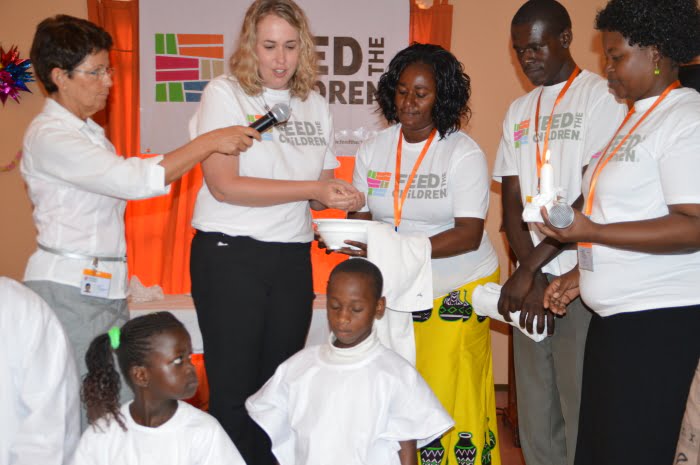 P.S. The reason we all had on Feed the Children shirts that day was for the staff photo afterwards. It wasn't like we were proclaiming the church of Feed the Children or anything 🙂
P.S. The reason we all had on Feed the Children shirts that day was for the staff photo afterwards. It wasn't like we were proclaiming the church of Feed the Children or anything 🙂
I travel a lot these days to hug children, to greet staff and to write stories about how Feed the Children’s donors are helping kids have clean water, access to education and more sustainable food sources around the world. Sometimes, I wake up not knowing where I am! But when I figure it out, I want to full present in that space, not somewhere else.
I'm back in United States this week, settling in, remembering, and telling others about my 3 week experience in Tanzania and Kenya. Trying to heed my own advice about being present here now . . .it is hard to do.
I keep thinking about Kenya. There are few words that can describe what happened. It was more profound that just seeing the life-changing work. It was more profound that having my eyes opened to deeper levels of poverty I'd ever seen. It was more profound than entering into the deep waters of relationship with my Kenyan friends and even more profound than being asked to baptize four of the children who are a part of our children's center in Nairobi.
No, this trip gave me a gift that only God could give.
The best words I have come from my songwriting friend, Sara Groves.
Something changed inside me broke wide open all spilled out
Till I had no doubt that something changedNever would have believed it till I felt it in my own heartIn the deepest part the healing cameSomething so amazing in a heart so dark and dimWhen a wall falls down and the light comes inAnd I cannot make it
And I cannot fake it
And I can't afford it
But it's mineSomething changed.
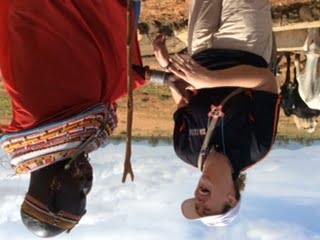

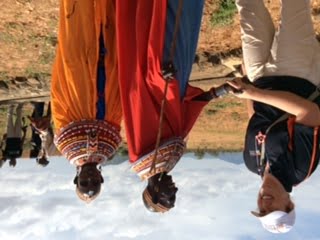
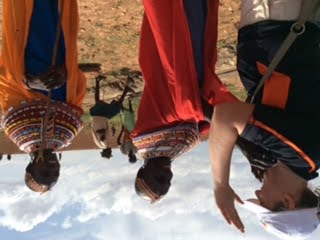
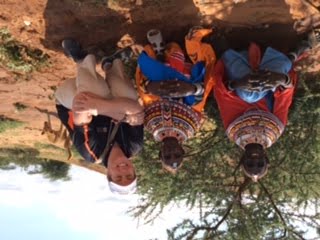
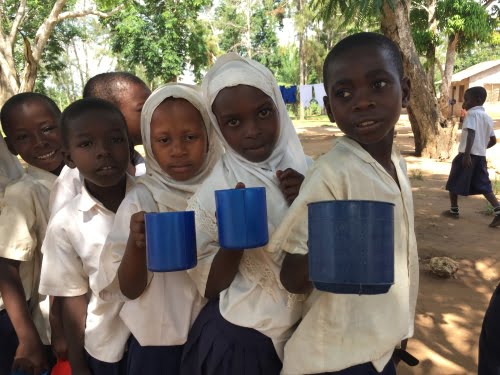 These weeks in Tanzania and Kenya, my eyes and ears have been overwhelmed by many things:
These weeks in Tanzania and Kenya, my eyes and ears have been overwhelmed by many things:
Children who walk miles to school without shoes.
Children without access to clean water in their community.
Children who grow up without parents.
Leaders who take advantage of their people, ignoring the needs of their children.
Knowing that God's heart aches for justice.
It's so easy in experiences like this to become angry, to blame, and to disengage.
It's not that there isn't a time a place for righteous anger, a time to stand up for what is evil . . . even Jesus modeled this for us when he turned over the tables in the temple, when the rebuked the overly righteous and welcomed the untouchable.
But so often we stay in this place. We exchange hate for hate. Hurt for hurt. Rejection for rejection.
This has often been me.
But, this week through lessons from a dear teacher, I've learned again that love is the only way.
We move forward in love because as Christians it is the life that God has called us to, and nothing else.
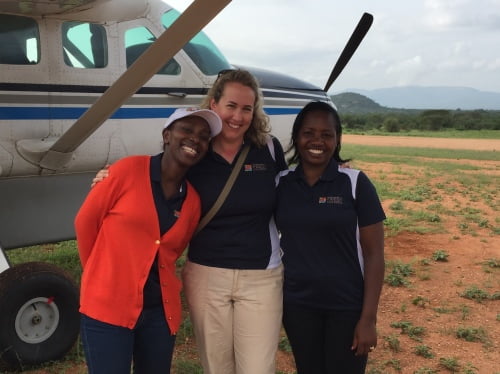 This is not to say that love doesn't have boundaries.
This is not to say that love doesn't have boundaries.
This is not to say that love doesn't have cost.
And most certainly it doesn't mean that love doesn't hurt.
But we love anyway.
We love those who see the world in hues different from us.
We love those whose actions we deem disgraceful.
We love those whose belief systems clash against our values.
We just love.
Why? Because it is how Christ shines through us.
And though we feel vulnerable and though we may feel crazy (I mean, who really loves their enemies?), we just love.
I've been challenged by the words of Brene Brown recently who writes in her book, Daring Greatly: “Vulnerability is the birthplace of love . . . If we want greater clarity in our purpose or deeper and more meaningful spiritual lives, vulnerability is the path.”
Vulnerability is the open door in which love has the ability to walk through.
And in vulnerability, we walk with others just as we are, even if loving is difficult for us.
We walk with others with an open heart, ready to receive whatever gifts come our way.
We walk with others not taking ourselves too seriously, remembering the One is in control most of all.
Not to sound overly clique but my word for this week is love is the only way. If you want to know the way forward in your life, start here. 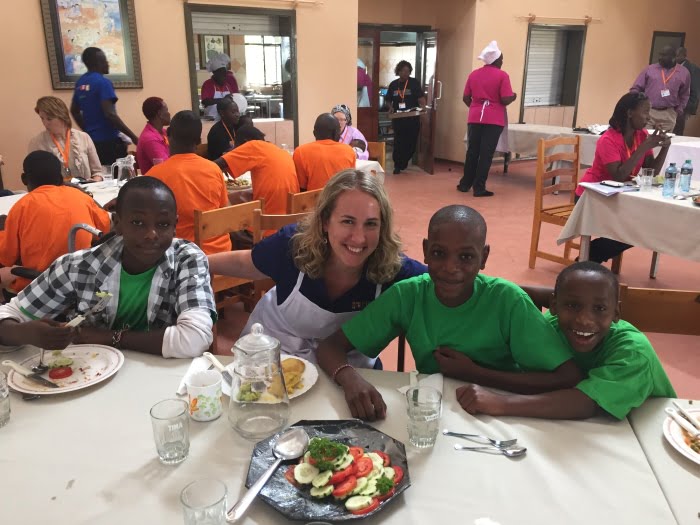
Jambo (hello) from Kenya.
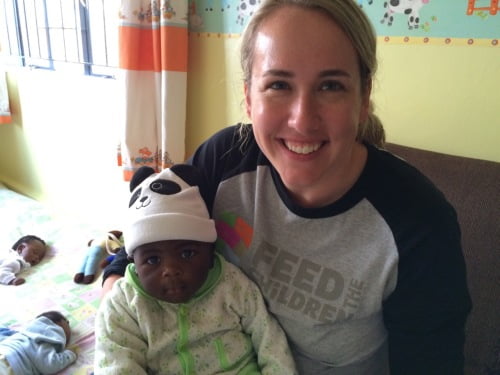 For the past two weeks, I've found myself traveling in East Africa to participate in the work of Feed the Children.
For the past two weeks, I've found myself traveling in East Africa to participate in the work of Feed the Children.
I've taken early morning flights. I've brushed my teeth with bottled water. I've visited primary schools. I've watched the sun set over the Indian Ocean. I've taken lots of pictures for FEED's social media. I've helped to cook Thanksgiving dinner for 50 kids. I've sorted Christmas presents. I've eaten more chips (french fries) than I should. I've held babies, lots of them.
In all of these things, I'm learning.
I'm learning about the importance of traveling with lots of vitamin C, good shoes and your own plane blanket.
I'm learning about having throw-up cloths near by at all times when holding babies, and never to underestimate the power of showing a child a picture of his or her face (what joy!).
I'm learning that slowing down is the way of life in Tanzania and good tea is everything you dream it to be and more in Kenya.
It's my 6th trip to the region since 1999. My East African country list includes Kenya, Malawi, Tanzania, Uganda and Rwanda as well as having flown through Ethiopia on multiple occasions. This region feels more and more part of my life every time I visit. In fact, the Feed the Children staff now greet me when I arrive, "Welcome home!"
I'm learning that when an African says, karibu (welcome) they really do mean it and want you to feel a part of their lives and space. 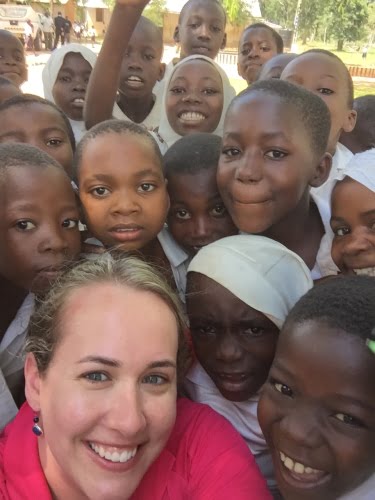
I'm learning the sweetness of friendship is so very possible here, even if there were so many reasons to be disconnected.
But even more than this, this preacher on the plaza is learning about my faith, the faith that I want to have in Jesus.
Coming to Africa reminds me that the Jesus I think I know isn't wrapped up in my American citizenship. Jesus always crosses racial and language divides. Jesus always leads us to the stories of the most vulnerable and ignored. And then asks us do something about what we hear!
Most of all I am learning to not be surprised when Africa opens my heart, like no other place on earth can.
To new friends.
To eyes that tell stories.
To shocking possibilities.
To hope.
One of my favorite authors, Anne Lamott says this: “Hope begins in the dark, the stubborn hope that if you just show up and try to do the right thing, the dawn will come. You wait and watch and work: you don't give up.”
There's so much I'm hoping for here.
For more children to be well-fed.
For nations and their leaders to be at peace.
For my own heart to live into what has eternal value.
Africa: what a classroom!
I'm so glad I'm here.
Sermon written for The Federated Church, Weatherford, OK
 Money doesn’t grow on trees; save before you spend. Prepare for retirement. Have your nest egg ready.
Money doesn’t grow on trees; save before you spend. Prepare for retirement. Have your nest egg ready.
Many of us learn and repeat such life management principles as if they were Bible verses. And, it’s common sense, right? And our financial advisors would tell us nothing less.
And, even if we aren’t talking about money, we are people who calculate our lives on good returns for our investments. For example:
We meet a newcomer in town whom we’d really love to spend more time with, but then after learning he’s is only going to be in the area for six months, we make no effort. Who wants to make a friend who will only leave soon?
We find a new recipe for a cake that looks to die for, but after learning such a tasty cake means rolling in layers and layers of filing for hours on end, we decide to forget it. Who has that kind of time?
We think of sponsoring a child in a local school who is struggling to keep up their coursework, but then look at our calendar again realizing we have less time to give than we originally thought. So, we fight off the guilt, but decline saying, “My hour a month couldn’t possibility make a difference.”
I think we all cautiously invest if we don’t see possibility of high returns.
Warren Buffet, one of the world’s richest men agrees. Though he would never give away publically his investment secrets, there are several principals that he readily prescribes to.
If you want to invest like Buffet: you’re told to:
And Buffet is not alone in thinking this way: the human experience is about a desire to be on the winning team.
And, with all of this being true about how WE see the world, how do we receive Jesus’ words from our gospel reading for today?
“Do not store up for yourselves treasures on earth, where moth and rust consume and where thieves break in and steal, but store up for yourselves treasures in heaven.”
So, I ask you this morning, in our interpretation: do we make these words purely spiritual, assuming Jesus is talking about some sort of soul winning process?
Do we modify Jesus’ words in our own minds? Interpreting them to be about our money yes, but only a small portion?
Or do we hear Jesus’ words as a radical interruption into what we invest in altogether—our time, our talent and our finances?
The last option is probably the scariest option of them all.
And it’s true, Jesus, as I’ve come to know him always blows my mind with his radical approach to all things on this planet. Yet, through Jesus’ teachings, we are invited into the kingdom of God—a kingdom where the investment advice of this world of even the richest men is reduced to rubbish.
I believe Jesus boils down his advice on investment to this: “what are you acquiring?”
Saying: “But store up for yourselves treasure in heaven, where neither moth nor rust consumes and where thieves do not break in and steal.“
It’s not that Jesus is saying stuff is bad. Or that we all don’t need stuff—like clothes in our backs, food in our bellies, or a way to get from point A to B. But he is asking us to consider the emotional and financial value we put on the stuff that surrounds our lives. Are we investing wisely?
What I find interesting about the placement of these 3 verses in Jesus’ Sermon on the Mount is that they immediately follow a series of exhortations about what it means to live your life of faith in community.
Earlier in the passage, Jesus tells his followers to beware of practicing their piety before others—as they give, as they pray and as they fast.
Give without making a show of it.
Go pray in your prayer closet.
Fast with a cheerful face.
And by verse 19—Jesus continues with this same thought--- encouraging his followers to reconsider how the stuff that surrounds their lives draws attention to themselves, gives them esteem.
 When I was 14 and started high school in Chattanooga, TN all I wanted was a North Face jacket. Not because I was one to be out in sub-zero temperatures. Not because I believed this particular kind of jacket would be durable for years to come. No. I wanted a North Face jacket because it simply said North Face.
When I was 14 and started high school in Chattanooga, TN all I wanted was a North Face jacket. Not because I was one to be out in sub-zero temperatures. Not because I believed this particular kind of jacket would be durable for years to come. No. I wanted a North Face jacket because it simply said North Face.
And all the cool kids had North Face. I wanted to be counted among them.
(Sadly, I never got such a jacket because my parents weren’t into name brands. But when I turned 30 and I decided just for the sake of being a grown up I “deserved” one and bought my own).
But, Jesus says store up treasures in heaven. Treasures that don’t get seen. And don’t give us labels as in a particular crowd in the here and now.
Why? Because what you acquire on earth can be destroyed.
Your livestock and grains in the barn can die or mold.
Your new shiny cars will one day rust.
Your granite countertops will soon be out of style.
Your financial portfolio will one day fall prey to stock market crashes.
You’ll leave your North Face jacket on a plane one day.
So lay up for yourselves treasures in heaven. Store up treasures in eternal things.
What might this be, you might wonder? Treasures in heaven?
At this juncture, commentaries rarely provide any insight here but here’s my two-word take. LOVE PEOPLE.
Invest the richness of your life in somebody other than yourself. Notice I didn’t say riches or wealth. Because often we might think, “Well I don’t have as much to give as so and so over there so why does it matter that I give? I’m sure somebody else can do my share . . . ”
In August of 2012, my husband and I traveled to Malawi and Kenya for our first overseas adventure right after he became President and CEO of Feed the Children – a trip I believe Kevin told you something about when he shared a bit of his testimony with you several weeks ago.
One of the most important stops for me on this trip came when we met a group of young men called the Hardy Boys-- group of 20s and 30s something young men with special needs. They’d lived in the Feed The Children orphanage in Nairobi, KENYA since childhood but who had aged out of the system. (Thus, the “Hardy House” was created for them to live in for the rest of their life for most all of them have no family that is interested in caring for them).
When I first met these “boys” I learned that because of their disabilities, they were unable to do the one thing that they most wanted to do—work. In a country like Kenya without the protection for accommodating work environments, there are no jobs with persons with disabilities. Literally their whole lives is about doing their chores around the group home, taking care of their chickens and monkeys that fill their yards in the afternoon and delighting in anyone who will come and have a cup of tea with them.
But when I began to get to know these boys, I realized that nothing had or could stop them from storing up treasures in heaven—investing in what has lasting value.
Our visit began with a meal, we ate together foods they thought we’d like the best. Pizza, It’s what all Americans like the best, isn’t it?
After supper we sang one of their favorite songs, “Kum By Yah” together. Drool rolled down the cheeks of some their faces and the blind members of the group twitched their heads back and forth. But the rest of them couldn’t stop clapping their hands. God came near—just as the words Kum By Yah are translated.
As we were getting ready to leave, one of the men, Christian motioned me over.
Christian, I’d learned was an artist. Though confined to a wheelchair and unable to use his right hair because of his cerebral palsy, he liked to draw and paint as often as he could.
Before I knew it, in my hand laid a sketchbook--- a year’s worth of his beautiful paintings. When I asked him what he was giving it to me? He simply said, “It’s yours.”
And this was my take away of the whole visit: in this motley crew that most everyone in the world had written off as unimportant and insignificant that I saw something about God that I, as a seminary educated, able bodied, able sighted person hardly knew: that God dwells where people invest in the kingdom of God.
For these men were using their life, even with all their challenges as instruments of God’s love in the world. They were in the business of storing up treasures in heaven.
And this is truth: investment that the Hardy boys understand and practice is all is what the kingdom of heaven is all about.
And friends gathered here in Weatherford, OK today, I have some good news for you.
Just like the Hardy Boys, we’ve all got richness in our life. We’ve all got talents. We’ve all got time to give. We’ve all got the ability to pick up the phone and tell someone we’re thinking about them. We can all love people. We can all love somebody.
And when loving people becomes our priority, the strings of our bank accounts will align themselves naturally toward the heart of God.
We’ll want to use what we have to contribute toward things that matter. It won’t be some thing we set out to do . . . it will just happen.
Today is Consencration Sunday-- usually one of the most dreaded days of the year by many churchgoers. For it's the time that you are asked to take time to consider and say publically that you are going to invest the ministries of the church this upcoming year by your intentional commitments of finances. I’ve experienced such a day in all the churches I’ve been a part of through the years
And I have to confess though that today is one of my favorite Sundays. Not because (as some of my pastor friends call it) it’s “Raise the Pastor’s Salary Day” but because of how days like today ask me to be serrious about my own financial investments.
And do it in community!
For it’s a day when we get to do something powerful together: invest our coming year in what has lasting value.
It’s a day we get to remember that our church is part of how God is bringing the kingdom of heaven to Weatherford, OK—and God is using each and every one of us to make it happen.
It’s a day we get to remind ourselves that our giving today can bless future generations.
Our pledge cards, though seemingly just a piece of paper with some numbers on them really mean so much!
It’s a document that says we believe in Federated Church and want others in the community to find the same love than we’ve found here.
It’s a document saying that our treasures are being stored beyond this place—in the good work that is going into the world through our 3 denominational bodies in the areas of outreach, justice and compassion ministry.
And especially this year, it’s a document saying our treasure is in our children, those who are here and those who will come in the future.
Even more so, as you sign that pledge card it’s a love note of sorts to the kids in our Positive Pathway program—that you care about them and want them to succed greatly in school.
So, my friends, I tell you today, in your pledging, in your giving to God, you are doing no small thing. You are investing in what can not be destroyed.
It's a high calling to invest like this. To believe that as Margaret Mead once said, “Never doubt that a small group of thoughtful, committed citizens can change the world; indeed, it's the only thing that ever has.” It’s a high calling to take Jesus’ words seriously.
But today let us practice doing just this: let us store up for treasures in heaven, where neither moth nor rust consumes and where thieves do not break in and steal. For where our treasure is, there our heart will be also.
AMEN
[i] “The Investment Principles of Warren Buffet” http://www.buffettsecrets.com/buffett-investment-principles.htm
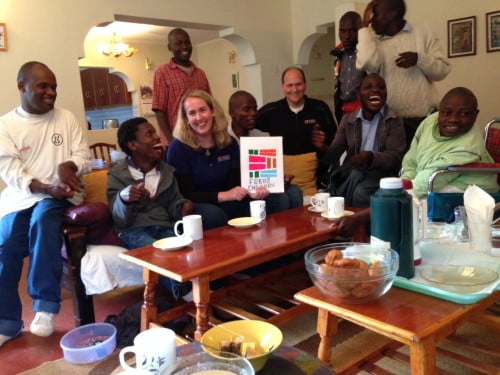 My mind has been dragging and my heart has lingered in this week and half that I've been home from Kenya. Thus, the reason the part 2 of this series has taken me so long to write.
My mind has been dragging and my heart has lingered in this week and half that I've been home from Kenya. Thus, the reason the part 2 of this series has taken me so long to write.
What can I say in response to a place that captures my heart so much? How can I adequately describe such an experience? Inadequately of course.
I left Kenya this time, the same way I leave Africa every time: full.
Full of new ways to articulate my own story.
Full of new discipline for my daily routines.
Full of new drive to do everything I can to support the mission of Feed the Children.
And most of all, full of love for the people for whom we serve and serve alongside. God gave so many saints to the ministry of Feed the Children and I couldn't be more grateful to know them.
So what can Americans learn from not being in America?
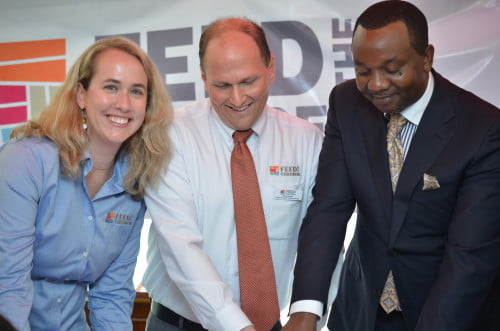 Here are just some of my additional thoughts:
Here are just some of my additional thoughts:
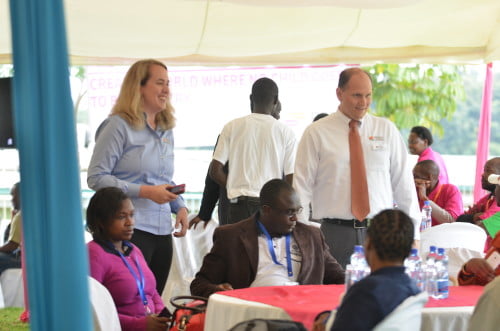 Might there be a way of living that sees Africans (or insert a cultural group other than my own) as completely equal partners in this work of learning how to be a human being, even with the differences?
I want to find more of this way of living-- the eyes wide open kind-- even as I am at home now.
Knowing that there are prejudices in me still waiting to be uncovered, judgments of my eyes that need to be brought to light and misconceptions I have about other colors of skin that need to be called out.
Being an American has given me (and maybe you too) so many gifts. Freedom to be is a beautiful part of our citizenship.
But, may we all not forget that we're not the only ones with blessings.We may be materially rich but we are oh so spiritually poor.
Our African, Asian and European brothers and sisters have much to teach us out of their blessings too.
Might there be a way of living that sees Africans (or insert a cultural group other than my own) as completely equal partners in this work of learning how to be a human being, even with the differences?
I want to find more of this way of living-- the eyes wide open kind-- even as I am at home now.
Knowing that there are prejudices in me still waiting to be uncovered, judgments of my eyes that need to be brought to light and misconceptions I have about other colors of skin that need to be called out.
Being an American has given me (and maybe you too) so many gifts. Freedom to be is a beautiful part of our citizenship.
But, may we all not forget that we're not the only ones with blessings.We may be materially rich but we are oh so spiritually poor.
Our African, Asian and European brothers and sisters have much to teach us out of their blessings too. The Way God Sees the World
A sermon preached from Matthew 5:1-12 & Micah 6:1-8
Let me start off this morning by saying that I realize the sermon title: “The Way God Sees the World” is presumptuous. Last time I checked, I was not nor ever would be called God. Even with a seminary degree and all from Duke Divinity School like your pastor (Go Blue Devils!) and with ordination accreditation ascribed to my name, I claim I am a human being with limitations to understanding the mystery of the Divine. And if there is one thing I am certain of in this world, God is God and I am not.
And I boldly offer such based on our New Testament lesson for this morning taken from Matthew’s gospel, chapter 5. For within the first 12 verses of this text, we find Jesus laying out for us some very straightforward, yet often misinterpreted descriptions of the world. God looks upon and says, “These folks get it. They’re not waiting on arriving in heaven to see my face and know me. They are living in the kingdom of heaven right now.”
Last week in our lectionary reading, the first disciples of Jesus have just been asked to join this new spiritual movement. Jesus met Peter, James, John and Andrew and said you’ll be fishermen no more— “Come fish for people with me.”
And as chapter 5 opens, Jesus’ teaching ministry is about get quite busy. Folks from all over the countryside have heard about him and are curious to know more. The crowds want to know what is Jesus’ next move. The disciples, however, are given premier access. Matthew 5 opens by telling us that the crowds have followed Jesus up to a mountainside. Jesus sits down with the disciples beside him and begins to say words that no one could have seen coming.
Jesus was expected by many to be a political leader after all—one who rose up to mobilize the Jews in force to overtake the oppressive Roman leadership.
If he truly was the Messiah—the one for whom they had been waiting for hundreds of years, then surely he’d have a message of power proclaiming himself ruler of all. Surely he would teach this crowd gathered to raise up an army and fight back
But instead of anything like this, what we hear is:
Blessed are the poor in spirit, for theirs is the kingdom of heaven.
Blessed are they that mourn, for they will be comforted.
Blessed are the meek, for they will inherit the earth. . . .
Biblical scholar NT Wright talks about this paradigm shift when he says: “When God wants to change the world, God doesn’t send in the tanks. God instead sends in the meek.”
And it is meek Jesus on the scene. But, was Jesus out of his mind? Did Jesus really know what he was saying?
Yep. He did. For Jesus goes on to call out these groups of people as blessed: poor in spirit, mourners, meek, the hungry, the merciful, the pure in heart, the peacemakers and persecuted. He’s making some very clear statements about what life will be like for those who want to follow him.
There are so many preachers and teachers who at this moment of a sermon would parse out this text for you by explaining the difference between blessed and happy. Some translations say these are the blessed statements others say these are the happy statements. These pastors would say, "Happiness is short-lived and blessing is eternal." And their message could be summed up as: “We oh people of God need to focus our attention on less worldly things”
Then there would be some preachers who would go down the route of telling you that the Greek adjective markarios which the NRSV translates to English as “Blessed” can actually mean “fortunate” “happy” “in a privileged position” or “well off” (all true in fact) saying if you follow exactly what Jesus says then you have more fortune, happiness or privilege in your life, etc. Joel Osteen, anyone?
And even others would go down the route of saying that the beatitudes are about missions. Jesus doesn’t favor the rich and well off in life they’d say. Then these preachers would come down hard on their congregations with a strong voice: “We’ll be a better church, oh people of God if we spend more of our budget on the “least of these” instead of on our fancy new buildings or big staff salaries.”
And to all of these interpretations, I say there would be some truth found within, but maybe not the deeper question that Jesus is trying to help us understand. And this is: how does God see the world?
I have been blessed (pardon the pun given today’s scripture) over the years to travel a lot internationally. When I was in high school, college and even seminary, I always jumped at the opportunity to go abroad on service learning trips. When I was 14, I took my first big adventure out of the country without my parents to the island of St. Vincent in the Caribbean to be mentored by a missionary teacher. And after that I was hooked. There was just something about seeing another country with a culture different from my own that enlivened me like nothing else could.
When I was 18, I booked a trip alone to Tanzania and Kenya for three weeks. Though I would be staying with friends of our family when I arrived, who were Americans, I was eager to get to know Africa as I’d had read and studied about it in school. I wanted to taste the food. I wanted to smell the air. I wanted to shake hands with new friends. I wanted to see Africa the way Africans saw their country.
But I have to tell you that whole trip turned out to be a bust. Never did I taste Ugali. Never did I go into any non-expats homes’. Never did I go anywhere that a person of non-European descent would go. My hosts wouldn’t allow it.
The Africa they saw, I learned, was the Africa through their American eyes. Their body had no sight or no taste for anything that didn’t resemble what was most familiar to them. For three weeks, I ate a lot of pancakes, pizza and tacos in Nairobi—strange, right? I came back to the US three weeks later only having tried bottled water from an African bottling company.
In the same way, I believe many of us read and understand the beatitudes much like my “Americanized African” trip.
We read these scriptures through the lens of what we know: being human, the way my friends introduced me to American food in Africa.
We digest scripture literally. We make salvation about where we go when we die. We might even look at beatitudes as a checklist for righteous behavior. And we stop engaging the scriptures right there.
We don’t take a step back and see the bigger picture. We don't see the feast of a new kind of life that Jesus is offering his followers. "Come learn of me," Jesus is saying, and "You will never position yourself in the world in the same way. Because the kingdom of heaven is not about some specific action you do. It’s not about how poor or rich you are. It’s not about how many mission trips your church takes. It’s about seeing the world with God’s vision, taking your place as a citizen of heaven even as you abide as a citizen of earth."
I'll say it again, you take your place as a citizen of heaven even as you abide as a citizen of earth.
This feast of living is what makes the gospel of Christ so mind shattering! The kingdom of heaven IS here and it can be known through human ambassadors like us. How? When we see the world as God sees it.
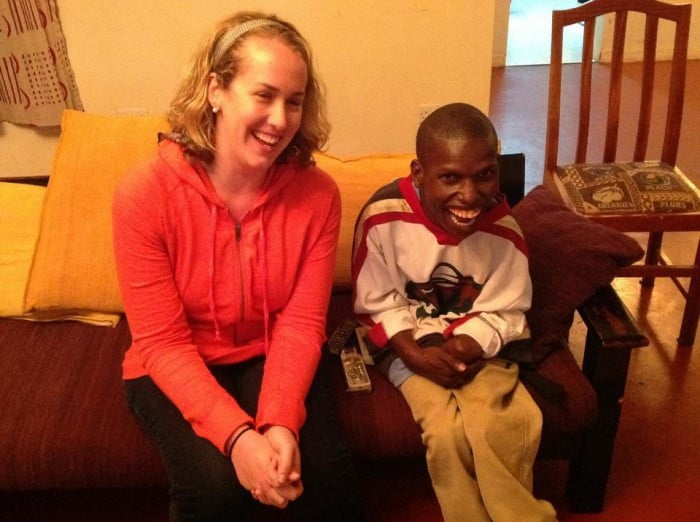 In August of 2012, my husband and I traveled to Malawi and Kenya for our first overseas adventure since he took over as President and CEO of Feed The Children a few months before. It was a trip of many jewels but one of the most important encounters for me during our time there was with a group of young men called the Hardy Boys—a group of 20s and 30s something young men with special needs. They had lived in the Feed The Children orphanage in Nairobi since childhood but had aged out of the system. (Thus, the “Hardy House” was created for them to live in for the rest of their life for most all of them have no family that is interested in caring for them).
In August of 2012, my husband and I traveled to Malawi and Kenya for our first overseas adventure since he took over as President and CEO of Feed The Children a few months before. It was a trip of many jewels but one of the most important encounters for me during our time there was with a group of young men called the Hardy Boys—a group of 20s and 30s something young men with special needs. They had lived in the Feed The Children orphanage in Nairobi since childhood but had aged out of the system. (Thus, the “Hardy House” was created for them to live in for the rest of their life for most all of them have no family that is interested in caring for them).
Though full of life challenges and unable to do the one thing that they all wanted to do—work—for there are no jobs with persons with disabilities in Kenya (like most developing countries), the joy in their faces communicated to us beyond words and moved me to tears. During our time, one of the men, Christian gave me a year’s worth of his beautiful paintings in a sketchbook (pictured to the right). We ate together a meal with foods they thought we’d like the best. And later around chairs, we sang one of their favorite songs, “Kumbayah” together while drool rolled down the cheeks of some their faces and the blind ones twitched their heads back and forth and the rest of them couldn’t stop clapping their hands.
It was in this motley crew that most everyone in the world had written off as unimportant and insignificant that I saw something about God that I, as a seminary educated, able-bodied, able sighted person hardly knew: that God dwells where people have given their life to Jesus—all of it.
And this is truth: the way God sees the world is much like the Hardy boys do. And on that August day in their living room, I was standing on holy ground.
This does not mean, however, that we should any way glamorize the harsh realities of poverty. It does not mean that embodying compassion or enduring persecution is a bed of roses. It does not mean that hungering for righteousness is a delightful kind of labor.
No- not at all: injustice is real in this world and God asks us to lend our voices to do what we can to speak out against the greatest ills. Doesn’t our Old Testament reading for this morning make it plain? “What does the Lord require of you? But to do justice and to love mercy and to walk humbly with our God.”
But in all of this, the world that God sees and Jesus exhorts us to get to know is a world where every mourner is comforted, where the meek inherit the earth, and where those who endure persecution KNOW they are doing divine work. And in this world there is joy, even in the midst of pain and suffering.
This kind of life goes against all modern notions of happiness. For in a nation where we constitute the "good life" with a well-paying job, children in good schools, the ability to go to see as many movies in a weekend that we want, granite countertops, stainless steel appliances and having enough money to hire someone to clean our house and cut our grass, we don’t realize how POOR and OFF the mark we really all.
Again, not that having things is bad. But just that we’ve got the narrative of blessing all wrong.
Are we focused alone on our little kingdom on this earth or are we seeing the kingdom of heaven come to earth?
This is what I know without a shadow of doubt: when we come and see the world that God sees it, we are blessed. God's kingdom IS among us! How could we not be?
We are blessed as we mourn.
We are blessed as we purify our hearts.
We are blessed as we make peace.
We are blessed because we are living within the kingdom of heaven. And though onlookers may say falsehoods about us and mock the ways we spend our time, our talents and our money, we can not be shaken for God gives us vision for the plans of his world. We just need to follow.
For Jesus’ coming and showing us the way to the kingdom of heaven, today we can rejoice and be glad. There’s more than meets the eye in this world in which we live and this is good news for all of us today.
AMEN
 I am now more convinced than ever that we in America are total wimps. Yes, wimps! Even those of us who think we are in "good" shape.
I am now more convinced than ever that we in America are total wimps. Yes, wimps! Even those of us who think we are in "good" shape.
I came to Kenya not necessarily thinking I was in good shape. But not in bad shape either. My body had seen the inside of a gym recently. I could climb stairs without huffing and puffing. I knew I ate more vegetables than I did fried foods.
But in the moment I set foot into a class called "Step Aerobics," with a friend here, I knew it would be more like boot camp than anything I'd ever known.
In the US every time I've attended a similar class, there were always options for routines. The teacher would say something like, "If this is too hard for you, try this." The teacher would be required by her fitness training to pay attention to the progress of the class participants-- if any looked like they were on the edge of passing out, the class would be stopped immediately. And of course there would be a lot of all class water breaks with instructions from the teacher at the beginning of the class, "If you need to stop and any time and get water, feel free to do so."
So these were my expectations coming into the same type of class yet in Kenya: options for routines. A teacher who cared about my distress. Lots of water breaks.
Yet, NONE of this was what I found.
As much as I wanted to pat myself on the back in congratulations that I was actually attempting exercise in a place so far from home, I quickly realized upon meeting Peter, the aerobics instructor, I'd not be flooded with praise just for showing up (as is the motto of my Golds Gym in the US).
Nor would I be praised for keeping up with the routines as he asked. Nothing about this experience would be about me and my needs.
There would be ONE option for the routine. If I was too out of shape to keep up, then I should just try harder.
The teacher did notice me. Yet, if I felt like I was going to die from the strain of the physical activity, then tough luck. I should just find a way to keep going.
There would be NO breaks for water. If I felt like I needed water in the 1.5 hours of the class, then oh well. For if I tried to sneak my way into getting some water, I'd be chased (yes, literally chased) back to the main part of the floor.
My friend told me afterwards, "There's a reason, you know why Africans runners always do so well at the Olympic Games." After all those years watching the Games on tv, I now understood completely!
And it is amazing what your body CAN do when you give it the "no stopping option." You keep going. You don't stop for as much water. You do one more sit up, one more leg lift, and one more "around the world" on the step bench. You don't want to be that out of shape and lazy American in the class.
I loved how I felt afterwards so much that I have already gone back 3 different times during the course of my visit. I guess I enjoy torture!
Who would have thought that coming to Africa for this now self-declared out of shape white lady, would bring a whole new opportunity for physical fitness?
One more fact to note about African Aerobics and that is the music.
In the gym in the US, the music for the routines often changes depending on the preferences of the instructor but usually is in line with whatever is the craze in pop music at the time. But in Kenya, going to such a class is like going to church. It's all Jesus music all the time. Or least a large portion of the routines are church songs.
Yesterday at class I heard Christian music hits from the early 90s like, "Awesome God" "You are Holy" and even an oldie, "This Little Light of Mine." Earlier in the week, I heard some of the Greatest Hits of Michael W. Smith.
Though I thought I was going to die (yes die and I'm not being dramatic here) at several points, I couldn't help but find amusement in the whole situation. Only in Kenya would I find myself in one of the hardest exercise classes I'd ever known all while listening to Jesus music. It kept me going.
What fun cultural experiences that I'll never forget! I know I will never complain in an US aerobics class again.
 In a couple of days my Kenyan adventures will be over-- for this time around-- and when I think of the word that comes to mind, all I am still stuck with is JOY.
In a couple of days my Kenyan adventures will be over-- for this time around-- and when I think of the word that comes to mind, all I am still stuck with is JOY.
How in a country with so much need, so much poverty, so much corruption can there be joy?
How in a line of work with so many motherless children and hungry mouths to feed can there be joy?
How in place where getting even the simplest of tasks accomplished takes SO long can there be joy?
But, JOY abounds here.
There has been joy in hearing the children at the orphanage learn more bits and pieces of English and shouting my name as I play with them on the playground "Elizabet, Elizabet!"
There has been joy in remembering that life is indeed about simple pleasures like a cup of tea, the ability to walk the stairs (even to the 8th floor), laugher when bumpy roads make the journey all the more interesting.
There has been joy in the deep waters of relationship-- feeling included, accepted and challenged along the way.
In this joy, I have felt a part of such a larger family-- a African family, a Kenyan family, even though my skin is white.
I have tasted the delight that is dessert at the end of the day-- eating it because it's too sweet of a moment not to indulge.
I have seen with my own eyes the beauty that is children feeling noticed by just one person-- human heart to human heart.
There's something about Africa that always stirs my soul and for this reason I haven't been able to do anything less than wake up here with a huge smile and a prayer, saying to God (in the spirit of the writer Anne Lamott): "Thank you, thank you, thank you."
Joy has come to me this week in cupfuls, bowlfuls and more than I can even take in. My spiritual bags are quite overflowing as I start to pack. And so I testify- taste and see that the Lord is good!